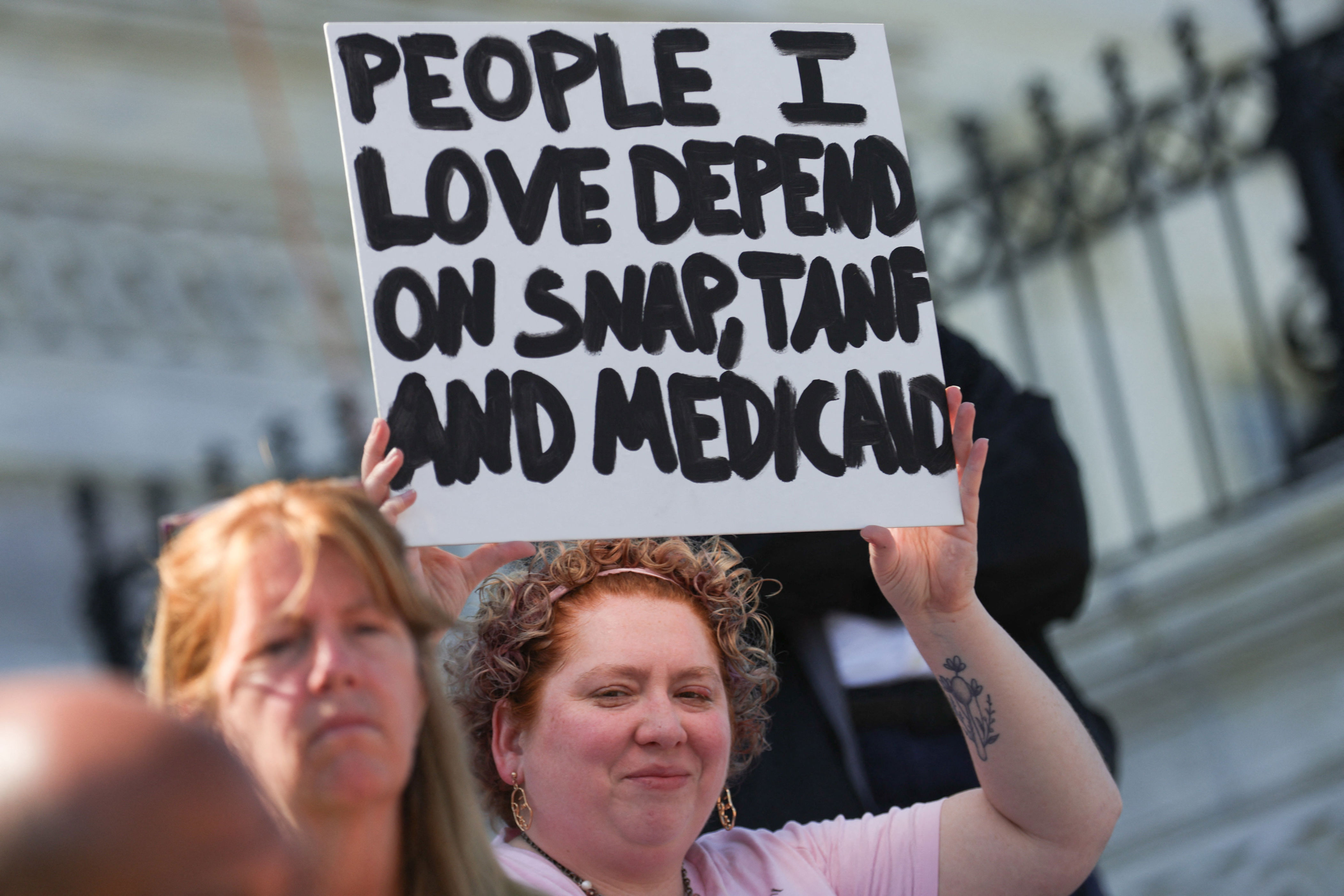Trump's Majestic Bill Nears Passage: What It Means for You
House Republicans are edging ever closer to getting President Donald Trump’s "magnificent big bill" by crossing the line through persuading Republican holdouts.
Lawmakers in the House Republican The caucus has been arguing about the future of their budget reconciliation package as Speaker Mike Johnson stated he desired a conclusive vote to occur on Wednesday.
President Trump's 'single, enormous, magnificent bill' will necessitate an immense, impressive vote," Johnson stated. "We are bound to accomplish this.
This legislation aims at reducing tax rates and boosting expenditure on oil exploration, defense capabilities, and border protection. It would also entail reductions in funding for Medicaid as well as nutrition aid initiatives.
This is a pivotal moment for the president and his party, as they've staked significant political resources during Trump's initial months back in the White House on this legislation. The timing coincides with substantial economic instability.
Democratic Leader Hakeem Jeffries said Republicans are trying to “quickly jam this unpopular legislation through the House because they know that the longer they wait, the more will come to light about this cruel and unconscionable bill.”
The legislation suggests cutting $1.5 trillion to free up $4.5 billion for tax reductions. If Republicans failed to locate $2 trillion worth of cuts , the amount of money left for tax cuts would be reduced by the difference between $2 trillion and the final number of spending cuts.
The nonpartisan Congressional Budget Office has cautioned that the plan would lead to an additional $3.8 trillion in the federal deficit.
Should the Republican members of the House align themselves with the president, this legislation will then move on to the Senate.
Who benefits the most from Trump’s spending bill?
Initial assessment from the Congressional Budget Office discovered that the bill would boost advantages for individuals with the highest earnings by prolonging the 2017 Republican tax legislation.
The alterations wouldn’t spread uniformly across all families," the organization predicts. "Typically, those at the bottom tenth of the earnings spectrum would see their resources diminish, while individuals at the top tenth could expect an upturn.
Although U.S. families could benefit from reduced taxes, the legislation disproportionately favors wealthy Americans, according to Martha Gimbel, executive director and co-founder of the Yale Budget Lab. She stated this in an interview. USA Today .
"It’s not so significant whether individuals at the lower end receive modest tax reductions if they’re losing their healthcare, seeing their SNAP benefits cut, and facing higher tariff costs," Gimbel stated.
How is Medicaid affected?

Over 70 million Americans with lower incomes depend on Medicaid for nearly free healthcare. suggested reductions by the House Republicans would experience a decrease in federal funding of around $700 billion over the coming ten years, according to the Congressional Budget Office.
The organization projected that the plans could decrease the count of individuals receiving healthcare by at least 7.6 million due to alterations in Medicaid, with potential further reductions stemming from modifications to the Affordable Care Act.
Trump warned House Republicans not to “f*** around” with Medicaid.
This proposal includes several modifications to be eligible for Medicaid. Under Trump’s legislation, able-bodied adults who do not have children or dependents must put in at least 80 hours per month working, participating in 80 hours of community service, or spending 80 hours on an education program, or some mix of these activities. Additionally, the bill ramps up how often recipients undergo eligibility checks, a change that specialists caution could lead to numerous Americans losing their coverage due to bureaucratic hurdles and complications with documentation.
Certain individuals will not have to meet these work obligations, such as those under 19 and over 64 years old, expectant mothers, young adults who were previously in foster care until they reach 26, persons with disabilities, members of Native American tribes, or folks already meeting job requirements set forth through the Temporary Assistance for Needy Families program or the Supplemental Nutrition Assistance Program.
The legislation also features a clause aimed at decreasing Medicaid funds for states that utilize their local tax money to offer healthcare coverage to unauthorized immigrants. This plan would predominantly affect so-called Blue states.
The White House stated that the legislation "defends Medicaid" by "terminating benefits for a minimum of 1.4 million unauthorized immigrants."
MAGA bank account
Nested within Trump's 1,116-page appropriations bill is a provision that would establish an automatic tax-advantaged investment account containing $1,000 for each American newborn, rolling out from 2025 through the close of 2028.
Its name, while a nod to the movement built by Trump, actually stands for Money Account for Growth and Advancement.
However, financial advisors cautioned that Americans have superior alternatives for tax-free savings accounts and the new MAGA account involves intricate regulations.
"It's like, thanks to the government for providing free money, but I'm more concerned with how useful it is," said Alan Cole, a senior economist at the Tax Foundation. Yahoo Finance And honestly, this ranks as the sixth or seventh best choice for a tax-free savings account.
SNAP cuts

Those who get food stamps via the programme overseen by the Agriculture Committee Supplemental Nutritional Assistance Program , referred to as SNAP, would also be subject to new work requirements under this plan.
Specifically, the bill raises the age at which capable adults without dependents have to be employed to qualify for nutrition assistance from 54 to 64 years old. This change aligns with the period just before numerous elderly individuals start receiving Social Security and Medicare.
Similarly, this change reduces the age at which children are classified as “dependents” from 18 down to under seven years old. This means that parents with children aged seven and above would be categorized as capable adults without dependents, thus requiring these individuals to engage in employment.
"It could very well be one of the most flagrant entries throughout the entire budget," Representative Angie Craig from Minnesota, who serves as the lead Democrat on the Agriculture Committee, stated. The Independent What will you do? Simply send parents off to work and let their seven-year-olds stay at home? Additionally, this exclusion disproportionately affects single parents compared to those who are married.
The Congressional Budget Office stated that approximately 3 million individuals per month would lose their SNAP benefits.
No tax on tips

The law features a provision allowing for a tax deduction of up to $25,000. cash tips for eligible employees working in the food, drink and beauty industries.
Approved by the Senate on Tuesday, the "No Tax on Tips Act" will now head to the House for voting. This legislation aims to revise the IRS code so that individuals employed in sectors such as food service, beverages, and personal grooming can take a full tax deduction on all tip earnings from various forms of payment including cash, credit, debit cards, and checks.
“The bill states that consideration should only be given to gratuities received from patrons or clients pertaining to the following services,” states The supplying, offering, or provision of meals or drinks intended for consumption, where it’s usual practice for patrons to tip staff who deliver or serve these foods or beverages.
It also states that those "offering beauty services to customers or clients when tipping for these services is usual" qualify as well.
After 90 days, if the bill is signed into law, the Treasury Secretary will “publish a list of occupations which traditionally and customarily received tips on or before December 31, 2023,” the bill says.
Anyone earning above $160,000 does not qualify for the tax exemption, however.
SALT cap
The State and Local Taxes limit, referred to as SALT, is a deduction that enables taxpayers to offset a portion of their state and local tax liabilities when they file their federal taxes.
Discussions about the ceiling, currently set at $10,000, have been ongoing. somewhat accountable for the holdup in finalizing Trump’s legislation as Republicans bickered.
A deal was made on Wednesday to increase the limit to $40,000 over ten years for families making under $500,000 annually.
For high-earning individuals who opt for itemizing their deductions instead of choosing the standard deduction, this limit represents a significant sum of money.
Additional reporting was provided by Eric Garcia. The Associated Press also contributed.
Since 1986, The Independent has been advocating for beliefs we stand behind, rather than those dictated to us, guided by the principles of integrity, inclusiveness, innovation, and independence.
Post a Comment for "Trump's Majestic Bill Nears Passage: What It Means for You"